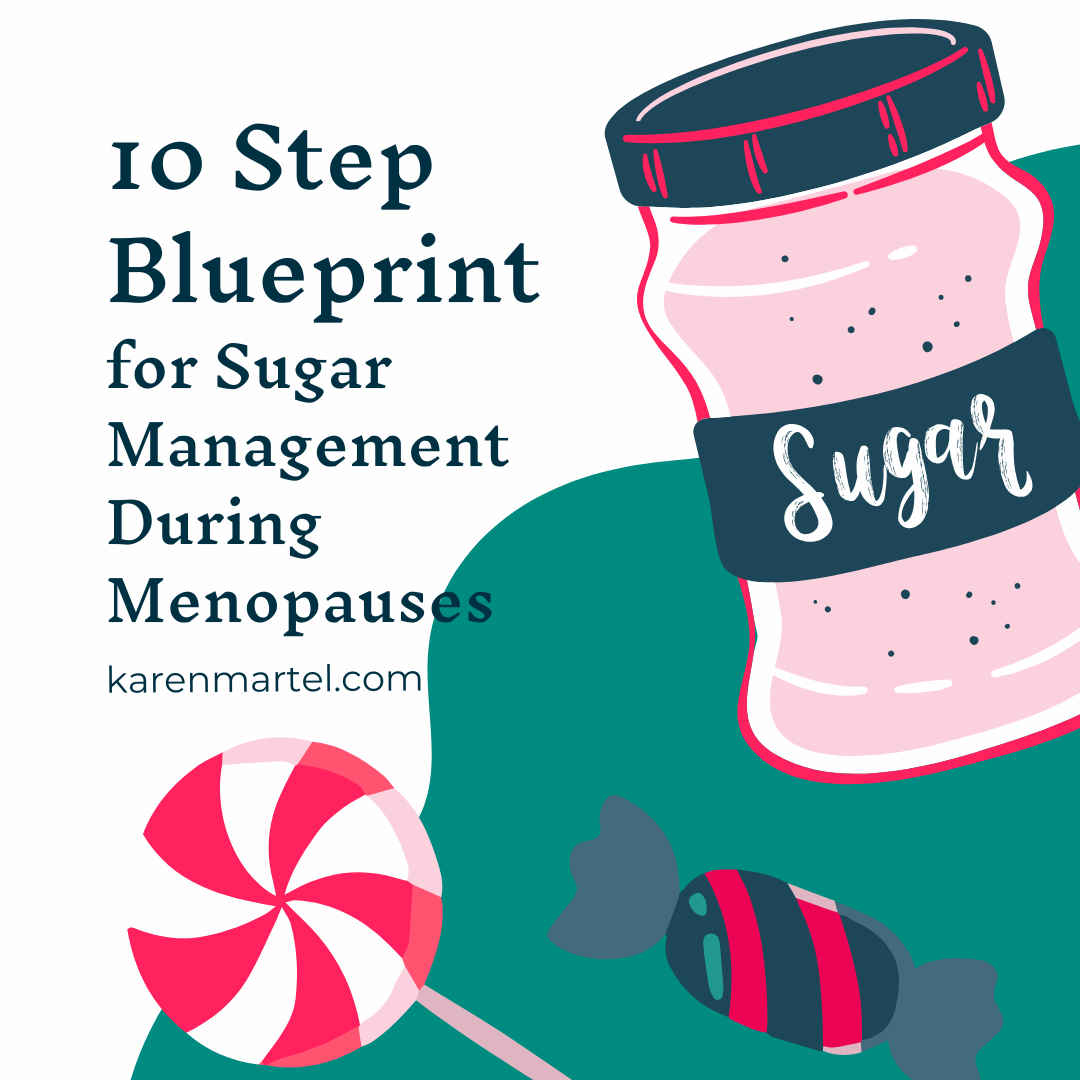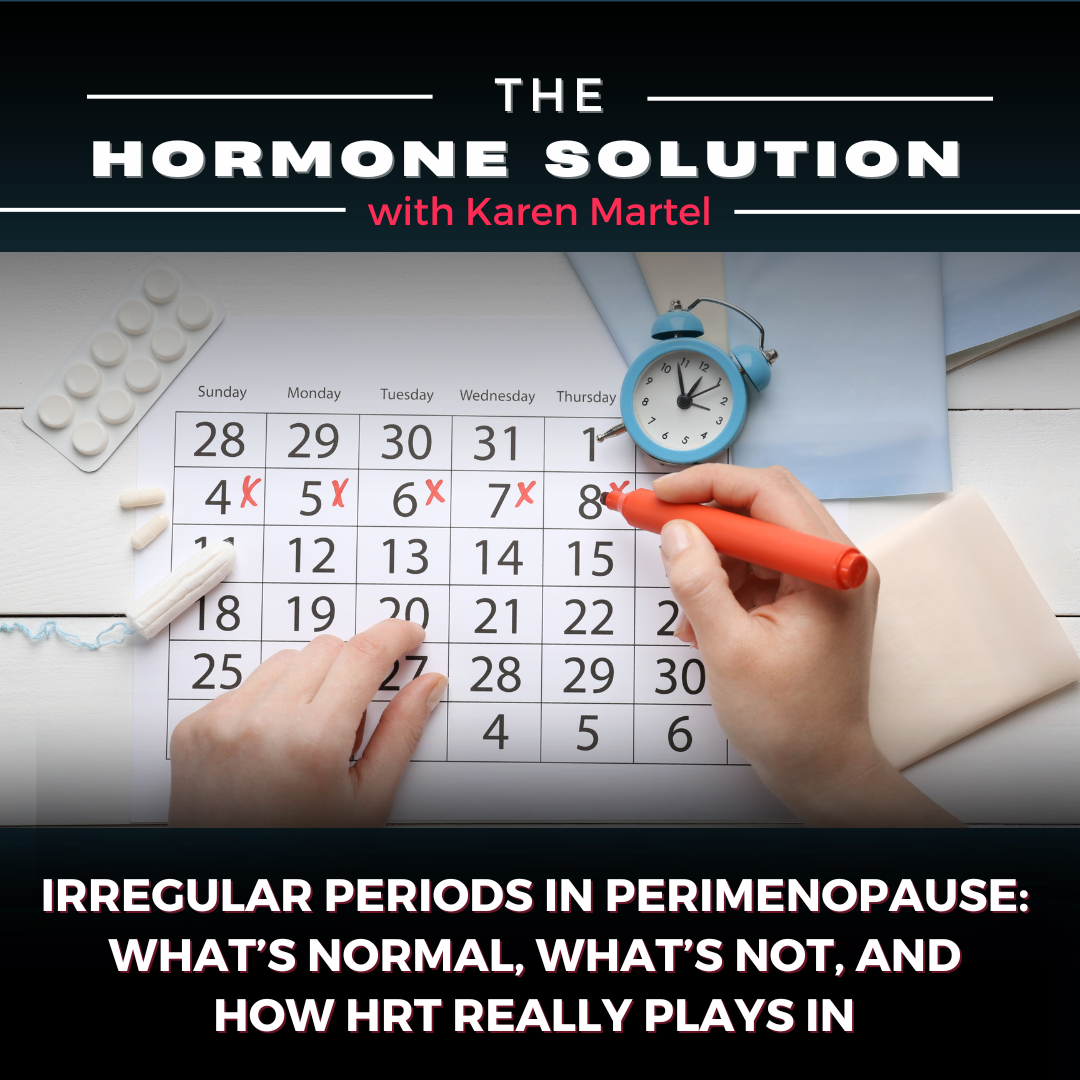
10 Step Blueprint for Sugar Management During Menopause
Menopause is a major milestone in a woman’s life, bringing hormonal changes that affect nearly every aspect of health. As estrogen and progesterone levels drop, you may notice shifts in metabolism, weight, and how your body handles sugar. Managing sugar intake during menopause isn’t just about cutting calories—it’s about supporting your body as it adjusts to this new hormonal landscape. Here’s the lowdown on the do’s and don’ts of sugar during menopause, so you can make informed choices that work with your body instead of against it.Why Sugar Matters During Menopause During menopause, fluctuating hormone levels can increase insulin resistance, making it harder for your body to regulate blood sugar. This doesn’t just affect your energy—it can amplify menopausal symptoms like hot flashes, mood swings, and fatigue. Research suggests that spikes in blood sugar levels may worsen menopausal symptoms, as the rollercoaster effect of glucose highs and lows can exacerbate hormonal fluctuations (North American Menopause Society, 2022). The loss of estradiol during menopause significantly impacts how the body regulates insulin, the hormone responsible for controlling blood sugar levels.
10 Step Blueprint for Sugar Management During Menopause
- Limit Added Sugars: Keep added sugars in check by steering clear of processed foods, sugary drinks, and desserts. The National Health Service (NHS) recommends limiting added sugar to 30 grams (7 teaspoons) daily for adults (NHS, 2023).
- Focus on Whole Foods: Whole foods like animal protein, vegetables, fruits, whole grains, and legumes provide fiber, which helps stabilize blood sugar levels.
- Include Protein in Every Meal: Protein is your blood sugar's best friend. It slows digestion and reduces glucose spikes, keeping your energy levels steady. Good sources include animal meats, whole dairy, fish, and eggs.
- Lift Weights and Build Muscle Weight lifting is one of the most effective exercises for managing blood sugar because it improves insulin sensitivity and helps your muscles use glucose more efficiently. Strength training builds lean muscle mass, which acts like a sponge for blood sugar, pulling it out of the bloodstream and reducing insulin resistance. It also boosts your metabolism, helping to maintain healthy blood sugar levels long after your workout is over. Plus, it’s a powerful tool for preventing the muscle loss that can worsen glucose control as we age.
- Track Your Reactions: Keep a food diary or wear continuous blood sugar monitor to observe how certain foods—especially those high in sugar—affect your symptoms. Everyone’s body reacts differently, so tuning into these patterns can be a game-changer (Harvard Medical School, 2022).
- Utilize Medications When Needed Microdosing GLP-1 medications like Mounjaro can be a game-changer for managing hunger, improving blood sugar regulation, and supporting weight loss without the intensity of higher doses. These medications mimic natural hormones that regulate appetite and insulin, making them highly effective tools for metabolic health. Similarly, “naltrexone” at low doses can help reduce cravings and emotional eating by modulating reward pathways in the brain. “Metformin”, a well-established medication, improves insulin sensitivity and helps stabilize blood sugar, making it a great option for preventing weight gain and reducing inflammation in those at risk for metabolic issues. Used thoughtfully, these medications can complement lifestyle changes for better long-term outcomes.
- Utilize Supplements When Needed Certain supplements can be powerful allies in managing blood sugar and insulin levels. Berberine is known for improving insulin sensitivity and reducing glucose production in the liver, making it comparable to some medications like metformin. Inositol, particularly myo-inositol, supports insulin signaling and can be especially helpful for women with PCOS. Chromium enhances the action of insulin, improving glucose uptake into cells and stabilizing blood sugar levels. Glutamine helps curb sugar cravings by stabilizing blood sugar and supporting gut health, which is critical for metabolic balance. These supplements work synergistically with a healthy lifestyle to support optimal blood sugar management.
- Hormone Replacement Therapy Hormone replacement therapy (HRT), particularly with estradiol, can play a significant role in blood sugar control during peri- and post-menopause. Estradiol helps improve insulin sensitivity, making it easier for your cells to use glucose for energy, and reduces the risk of insulin resistance, a key driver of weight gain and type 2 diabetes. It also supports fat distribution away from the abdominal area, which is critical for metabolic health. By maintaining healthier blood sugar levels and reducing visceral fat accumulation, HRT can help mitigate the metabolic challenges many women face as estrogen levels decline.
- Avoid Sugary Drinks: Beverages like sodas, energy drinks, and even flavored coffee drinks are often sugar bombs that cause blood sugar spikes and crashes. Opt for unsweetened alternatives like herbal teas or black coffee (Centers for Disease Control and Prevention, 2023).
- Intermittent fast Moderate intermittent fasting can be a great tool for blood sugar control. By creating longer breaks between meals, it allows insulin levels to drop, which helps improve insulin sensitivity over time. This means your body becomes more efficient at using glucose for energy, reducing the risk of insulin resistance. Fasting periods also give your body a chance to tap into stored fat for energy, helping to stabilize blood sugar levels and avoid the spikes and crashes often caused by frequent eating. Just be sure to approach fasting in a balanced way to avoid adding unnecessary stress to your body, especially during menopause.
Why It’s Worth It Controlling blood sugar during peri and post-menopause is essential for overall health and well-being. Here are the key benefits:
- Reduced Belly Fat: Stabilized blood sugar helps minimize insulin spikes that lead to fat storage, especially around the abdomen.
- Improved Energy Levels: Balanced blood sugar prevents energy crashes and keeps you feeling steady throughout the day.
- Hormonal Balance: Stable blood sugar supports better regulation of hormones like cortisol and insulin, which can impact overall hormonal health.
- Better Mood: Avoiding blood sugar swings can reduce irritability, anxiety, and mood fluctuations common during this life stage.
- Weight Management: Preventing insulin resistance aids in maintaining a healthy weight and avoiding excess fat gain.
- Heart Health: Controlling blood sugar reduces the risk of cardiovascular issues by minimizing inflammation and improving lipid profiles.
- Brain Health: Stabilized blood sugar reduces the risk of cognitive decline and brain fog, which are sometimes linked to blood sugar dysregulation.
- Lower Risk of Type 2 Diabetes: Managing blood sugar during menopause can prevent the development of insulin resistance and type 2 diabetes.
- Reduced Hot Flashes: Some studies suggest blood sugar imbalances can trigger hot flashes, so keeping levels steady may help.
- Preservation of Muscle Mass: Stable insulin levels support muscle maintenance, which is crucial during menopause when lean mass naturally declines.
Conclusion Menopause is a season of change, and your diet can be one of the most powerful tools in managing it. By making thoughtful choices about sugar intake—limiting added sugars, focusing on whole foods, and balancing meals—you’ll not only feel better in the short term but also protect your long-term health. Embrace this phase with curiosity and care. Small shifts in how you nourish your body can empower you to navigate menopause with confidence and vitality. And remember, it’s okay to enjoy a treat now and then—just savor it mindfully and move forward.
References
- North American Menopause Society. (2022). Managing Menopausal Symptoms. Retrieved from www.menopause.org
- National Health Service (NHS). (2023). Sugar Guidelines for Adults. Retrieved from www.nhs.uk
- Harvard School of Public Health. (2021). Sugars and Health. Retrieved from www.hsph.harvard.edu
- Mayo Clinic. (2022). Insulin Resistance and Diet. Retrieved from www.mayoclinic.org
- National Institute on Aging. (2023). Healthy Aging Tips. Retrieved from www.nia.nih.gov
- Centers for Disease Control and Prevention. (2023). Managing Blood Sugar Levels. Retrieved from www.cdc.gov
- American Diabetes Association. (2023). Nutrition Guidelines for Diabetes. Retrieved from www.diabetes.org
- American Heart Association. (2023). Added Sugars: What You Need to Know. Retrieved from www.heart.org

Find Karen Martel on Apply Podcast
Karen Martel is a Certified Hormone Specialist and Transformational Nutrition Coach dedicated to empowering women through their health journeys.
As the host of the popular podcast The Hormone Solution, Karen tackles the complexities of hormonal health, weight loss resistance, and the challenges that come with perimenopause and menopause.
Her mission is to disrupt outdated narratives surrounding women's health, providing reliable information and practical solutions that help women reclaim their vitality.
Tune in to discover how to embrace life's stages while enhancing overall well-being.





